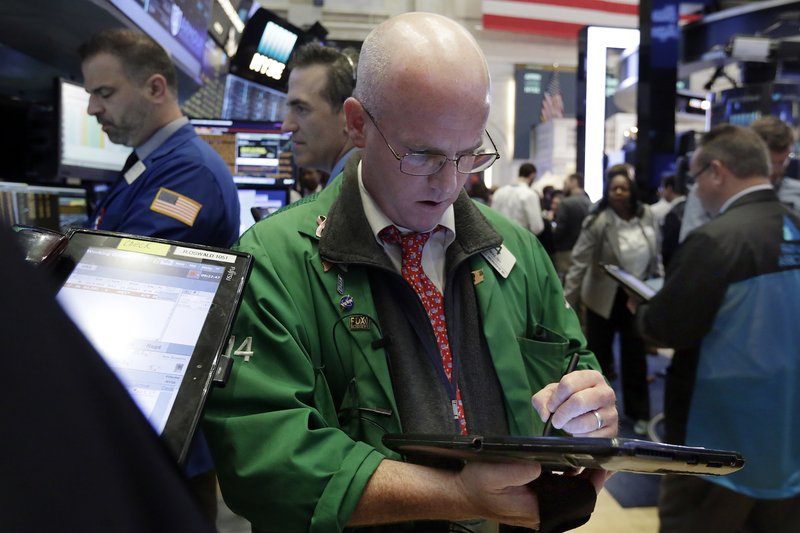A steep slide in the value of technology stocks pulled U.S. the market lower Thursday, erasing gains from the previous day.
Investors also sold big-dividend stocks as bond yields rose. Banks and energy stocks bucked the broader market decline. Crude oil prices closed higher for the sixth straight day.
The Standard & Poor's 500 index fell 20.99 points, or 0.9 percent, to 2,419.70. The Dow Jones industrial average slid 167.58 points, or 0.8 percent, to 21,287.03. The average was down briefly more than 257 points.
The Nasdaq composite fell 90.06 points, or 1.4 percent, to 6,144.35. The Russell 2000 index of small-company stocks gave up 9.07 points, or 0.6 percent, to 1,416.20.
Bond prices fell. The 10-year Treasury yield rose to 2.27 percent from 2.23 percent late Wednesday.
The shift out of the technology sector came as investors bet central bankers may be ready to lift rates. That spurred many traders to move out of growth sectors, such as technology, and into value stocks, such as banks, said Erik Davidson, chief investment officer at Wells Fargo Private Bank.
"It's been a good day for energy and financials and a terrible day in particular for technology," Davidson said. "To the extent that you're going to be looking to put money into financials, into energy, you have to pull it from somewhere, and the sector that has done best so far this year is technology."
The stock market was coming off its biggest gain in two months. The market slide came about despite some encouraging news on the U.S. economy.
The Commerce Department said the nation's gross domestic product, the broadest measure of economic health, increased at an annual rate of 1.4 percent in the first quarter. That's better than the previous estimate of 1.2 percent and double the initial estimate of 0.7 percent. The upgrade reflects newfound strength in consumer spending and exports.
Semiconductor manufacturers led the technology sector slide.
Advanced Micro Devices fell the most among companies in the S&P 500 index, losing 63 cents, or 4.8 percent, to $12.60. Lam Research fell $5.48, or 3.7 percent, to $142.35. Alphabet, Google's parent company, also fell, shedding $23.19, or 2.4 percent, to $937.82. Facebook shares fell $2.20, or 1.4 percent, to $151.04. Apple slid $2.15, or 1.5 percent, to $143.68.
Bank stocks also got a boost from the Federal Reserve. The central bank said late Wednesday that 34 of the biggest U.S. banks can buy back more stock and raise their dividends because their balance sheets are strong enough to bear a major downturn in the economy.
The Fed's announcement marked the first time that all of the banks passed their so-called stress tests, which were created after the global financial crisis of 2008.
Citigroup shares rose $1.80, or 2.8 percent, to $66.98, while Regions Financial climbed 57 cents, or 4 percent, to $14.66. Bank of America added 44 cents, or 1.8 percent, to $24.32.
Oil prices closed higher despite paring some early gains. Benchmark U.S. crude rose 19 cents to settle at $44.93 a barrel in New York. Brent, the international standard, gained 9 cents to close at $47.63 in London.
Business on 06/30/2017

